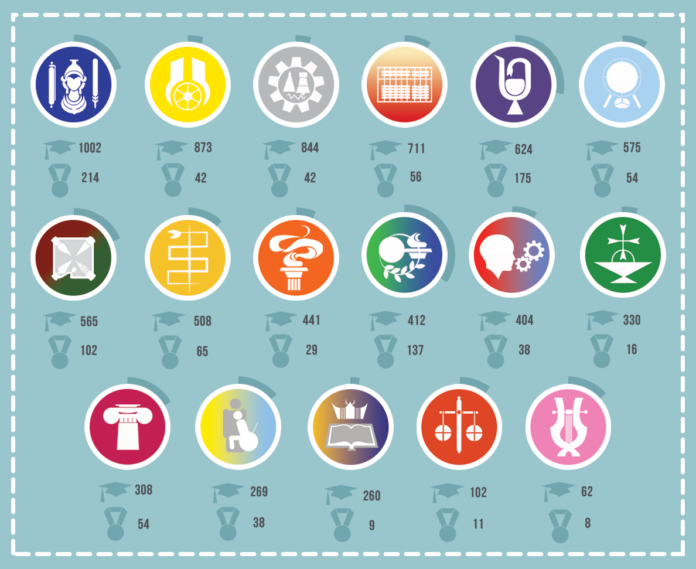THE NUMBER of Thomasian honor graduates rose by 11 percent on account of higher admission standards, teaching innovations and improved curricula, deans from UST’s colleges and faculties said.
Batch 2017 produced a total of 1,090 academic awardees out of 8,276 graduates: 935 cum laudes, 148 magna cum laudes and seven summa cum laudes, data from the Registrar showed. This was higher than last year’s 979 honor graduates.
The Faculty of Arts and Letters was the top producer of honor graduates, producing 188 cum laudes and 26 magna cum laudes out of 1,002 graduates.
Artlets Assistant Dean Narcisa Tabirara said the faculty’s admission standards affected the number of honor graduates.
“Despite the high number of applicants, the students selected to enroll are only students who have the greatest potential to be the best students,” Tabirara told the Varsitarian.
Tabirara added that Artlets are achievement-oriented, which contradicts the notion that they are “not very serious” students.
“Students accepted in AB have the greatest possibility to succeed which belies the impression that they are happy-go-lucky students. In fact, they are no longer interested to just graduate with honors but to get into the international circuit,” Tabirara said.
The Faculty of Pharmacy produced 175 honor graduates out of 624, compared with last year’s 157 out of 682.
Medical technology graduate Neill Steven Cachuela is this year’s batch valedictorian, with a general weighted average of 1.059. He was also a recipient of the Rector’s Academic Award.
The College of Tourism and Hospitality Management maintained the highest ratio of honor graduates to the total number of graduates, with 137 honor graduates out of 412, surpassing last year’s 114 out of 456 graduates.
Architecture, law
The College of Architecture produced its first summa cum laude: Jemi Marie Sy Ling, who had an average grade of 1.186.
“[It is] enlightening and inspiring to the younger ones because they have something to look after,” Architecture Dean Rodolfo Ventura said.
Architecture’s honor graduates went up to 54 out of 308 graduates, from 32 out of 393 graduates last year.
The Faculty of Civil Law had a notable increase, with 11 Latin honor recipients out of 102 graduates from last year’s one cum laude.
Civil Law Dean Nilo Divina said this was the first time in 25 years that the law faculty produced a significant number of honor graduates.
“We did a lot of innovations, we have compiled the Supreme Court decisions of the last five years, prepared case digests of the chairman of the bar examination last year and made them available for examinees,” Divina said in an interview.
Increase, decrease
The number of Latin honor recipients in the College of Fine Arts and Design (CFAD), College of Rehabilitation Sciences (CRS), Institute of Information and Computing Sciences (IICS), UST-Alfredo M. Velayo – College of Accountancy and College of Nursing also rose.
CFAD and Accountancy produced 102 honor graduates out of 565 and 56 honor recipients out of 711, respectively. Last year, CFAD had 59 honor graduates out of 916 while Accountancy had 53 honor graduates out of 753.
CRS and IICS both had 38 honor graduates this year out of 269 and 404 graduates, respectively. Last year, CRS produced 30 honor graduates out of 242 while IICS had 32 honor graduates out of 481.
The number of honor graduates in Nursing also went up to 16 out of 330 graduates, beating last year’s 10 out of 346.
College of Nursing Dean Susan Maravilla said the college was constantly reviewing its curriculum, training policies and requirements.
“Grades and honors are not the only thing that matter, it is the performance of the graduate in the field once they graduate that will matter most,” Maravilla said.
The Faculty of Engineering, Conservatory of Music, College of Commerce and Business Administration, College of Education, College of Science and Graduate School had fewer honor graduates this year.
The Graduate School produced only nine honor graduates out of 102, from last year’s 74 out of 217.
Engineering‘s honor graduates declined to 42 out of 844, from last year’s 54 out of 841. Music recorded eight honor graduates out of 62, lower than last year’s 14 out of 70.
Commerce produced 42 honor graduates out of 873 compared with last year’s 59 out of 916, while Education had 29 honor graduates out of 441 from last year’s 44 out of 482.
The number of honor graduates in the College of Science decreased to 54 out of 574 graduates, from last year’s 68 out of 643.
College of Science Dean John Donnie Ramos said they encourage students through the “St. Albert Degree Circle,” which cites students who got at least two grades of 1.00 in a term.
“It is very important to graduate with honors in the field of science like biology and psychology. These students will eventually [pursue] medicine because many of the medical schools will give scholarships,” Ramos said.
The Faculty of Medicine and Surgery produced 65 honor graduates out of 508 this year.
Figures from the Institute of Physical Education and Athletics and the Ecclesiastical Faculties were excluded from this report.





















